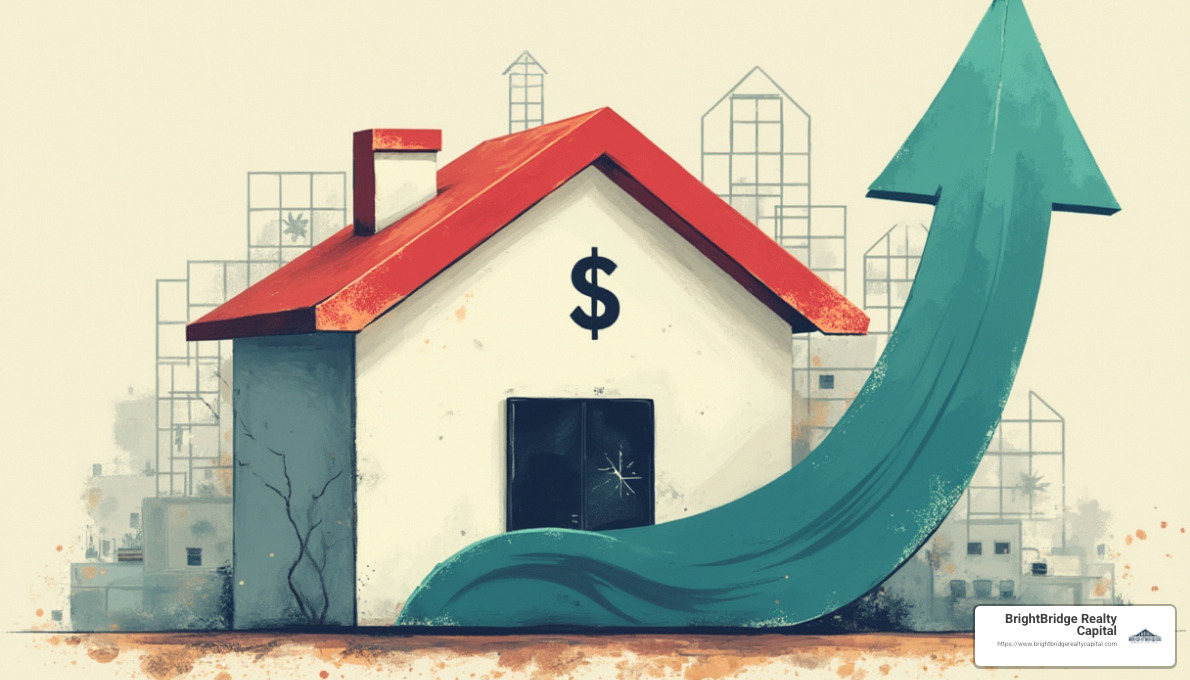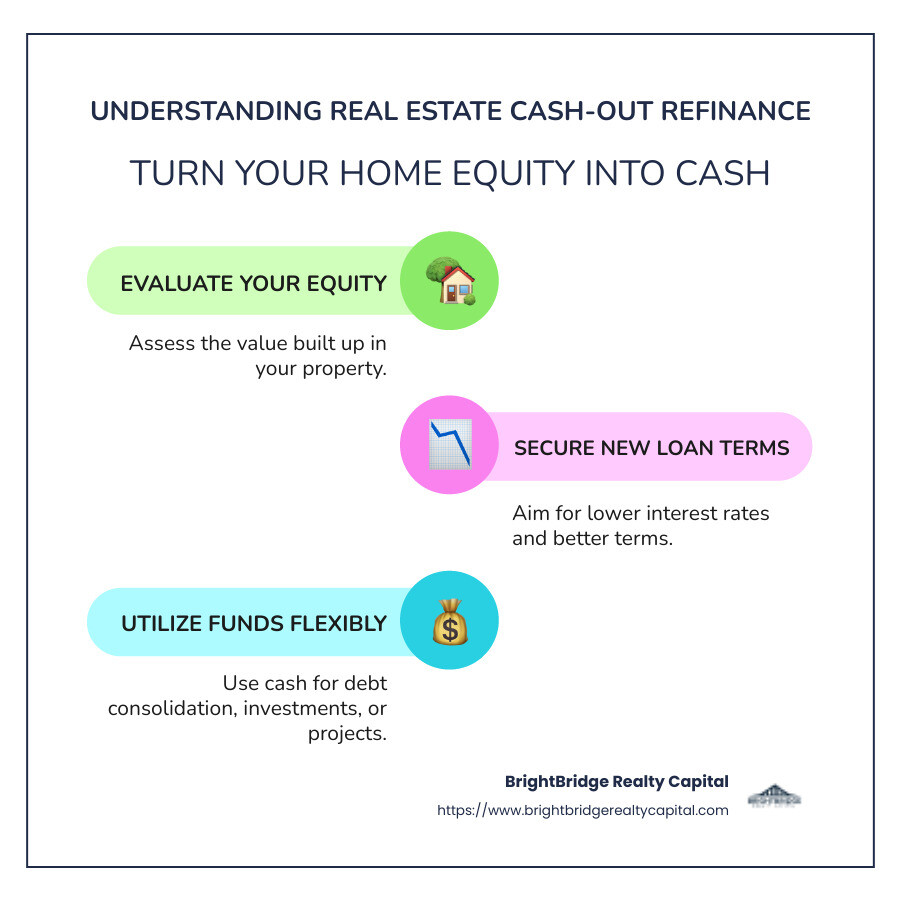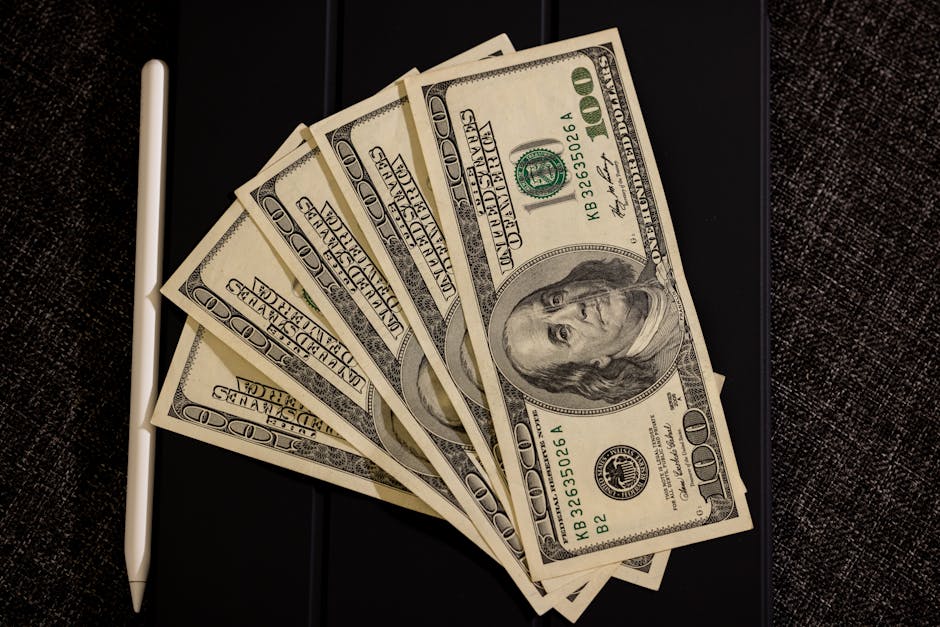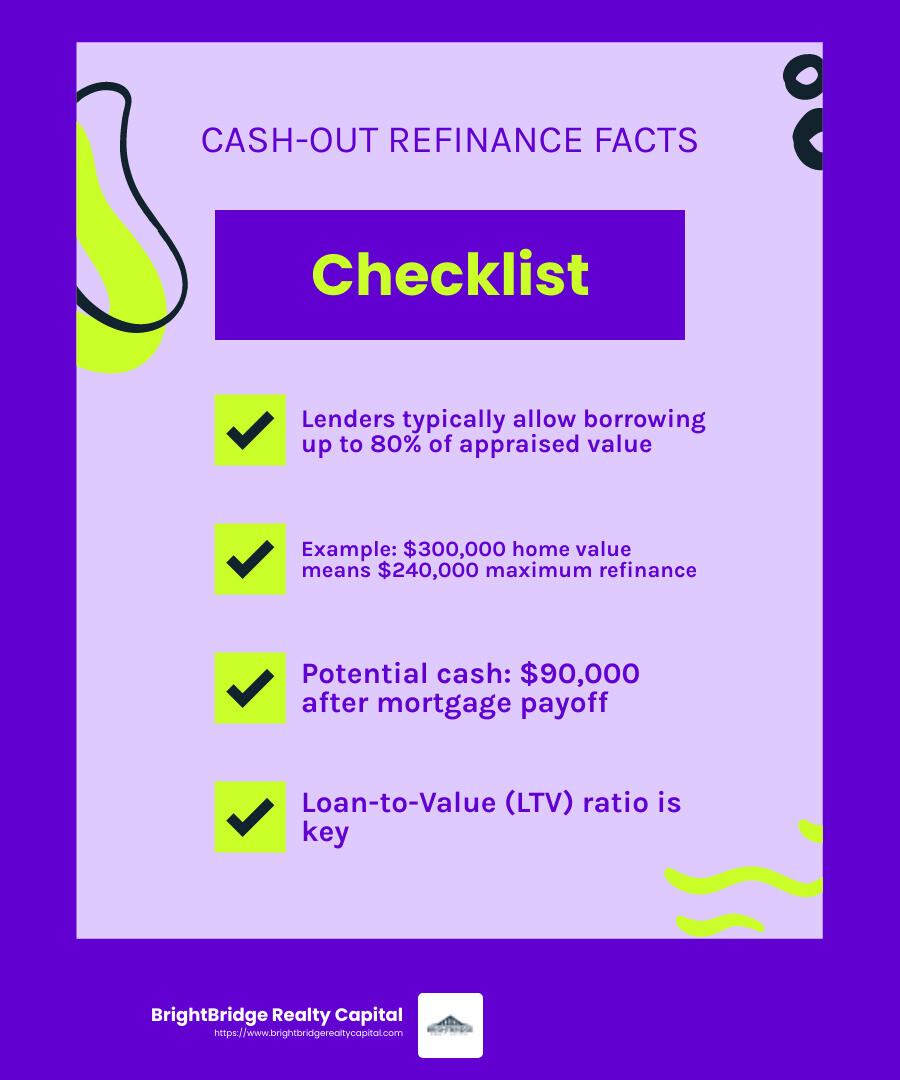Cash-Out Refinance: Turning Home Equity into Opportunity

Real estate cash-out refinance is a powerful tool that turns the equity in your home into cash, opening doors to a world of opportunities. Whether you're looking to consolidate debt, fund a new project, or invest in further property ventures, understanding this financial option can be the key to open uping your potential.
Here's a quick breakdown of what real estate cash-out refinance involves:
- Home Equity Utilization: Tap into the value you've built up in your home without selling it.
- Refinancing Advantage: Potential to secure better loan terms, including lower interest rates.
- Flexible Cash Use: Funds can be used for various personal or investment purposes, with no restrictions.
Real estate cash-out refinance offers a way for homeowners and real estate investors to access needed funds by leveraging existing property assets. It's about changing the nest egg within your home into a tangible resource for growth and diversification—whether by expanding your rental portfolio or starting on a new renovation project.
"Tapping your equity allows you to access needed funds without having to sell your home or take out a higher-interest personal loan."

Real estate cash-out refinance terms to learn:
Understanding Real Estate Cash-Out Refinance
Real estate cash-out refinance is a method that allows homeowners to open up the potential of their home equity. It involves replacing your current mortgage with a new, larger one, and receiving the difference in cash. This lump-sum payment can be a game-changer for those looking to make significant financial moves.
Home Equity: Your Financial Resource
Home equity is the difference between your home's market value and the amount you owe on your mortgage. It's like a savings account within your property. As you pay down your mortgage or your home's value increases, your equity grows.
Imagine owning a home worth $400,000 and owing $100,000 on your mortgage. You have $300,000 in equity. With a cash-out refinance, you could access a portion of this equity, turning it into cash for immediate use.
Mortgage Replacement: The New Loan
When you opt for a cash-out refinance, you replace your existing mortgage with a new one. This new loan is larger than your current mortgage balance. For example, if you owe $100,000 and want $50,000 in cash, your new mortgage will be for $150,000.
This process not only provides you with cash but may also offer better loan terms, like a lower interest rate or a different repayment period.
Lump-Sum Payment: Immediate Access to Funds
The cash you receive from a cash-out refinance comes as a lump-sum payment. This means you get the money all at once, which can be used for anything from home improvements to paying off high-interest debt.

The flexibility of this cash allows you to address immediate financial needs or invest in opportunities that can improve your financial future.
By understanding real estate cash-out refinance, you can make informed decisions about leveraging your home equity for growth and financial stability.
How Real Estate Cash-Out Refinance Works
Collateral: Your Home is the Key
In a real estate cash-out refinance, your home serves as collateral. This means the lender has a claim on your property until you pay off the new loan. Because your home backs the loan, lenders often offer lower interest rates compared to unsecured loans like credit cards.
Using your home as collateral can be a smart move if you need a large sum of money and want to benefit from lower interest rates. But remember, if you can't keep up with payments, you risk foreclosure.
The New Loan: Bigger and Better
When you go through a cash-out refinance, you're essentially getting a new loan. This loan is larger than what you currently owe on your mortgage. For instance, if your home is valued at $400,000 and you owe $100,000, you might refinance for $150,000. This gives you $50,000 in cash while covering your existing mortgage.
This new loan replaces your old one, often with different terms. You might get a lower interest rate or adjust the length of your mortgage. Changing the loan term can affect your monthly payments, so it's crucial to choose terms that fit your budget.
Interest Rates: Saving Money Over Time
One of the big draws of a cash-out refinance is the potential for a lower interest rate. If rates have dropped since you took out your original mortgage, refinancing could save you money. Even a small reduction in interest can lead to significant savings over the life of the loan.
However, if your credit score has improved since you first got your mortgage, you might qualify for even better rates. It's wise to shop around and compare offers from different lenders.
A Strategic Move for Your Finances
By using your home as collateral and securing a new loan, a cash-out refinance can provide financial flexibility. It allows you to tap into your home equity while potentially lowering your interest rate. This can be a powerful tool for managing debt, funding home improvements, or investing in new opportunities.
Understanding these aspects of a real estate cash-out refinance can help you decide if this option aligns with your financial goals.
Next, we'll explore the benefits of choosing a cash-out refinance for your financial needs.
Benefits of Real Estate Cash-Out Refinance
A real estate cash-out refinance offers several compelling benefits that can help you achieve your financial goals. Let's break down some of the key advantages:
Debt Consolidation: Simplify and Save
One of the most popular reasons for choosing a cash-out refinance is debt consolidation. If you're juggling multiple high-interest debts, like credit cards or personal loans, a cash-out refinance can streamline them into a single, lower-interest payment. This not only simplifies your financial life but also saves you money on interest over time.
Imagine you have several credit cards with interest rates above 15%. By consolidating these debts into your mortgage, which may have an interest rate closer to 4% or 5%, you can significantly reduce your monthly interest payments. Over the long term, this strategy can free up cash to pay down other debts or even accelerate your mortgage payoff.
Home Improvements: Invest in Your Property
Another significant advantage of a cash-out refinance is the ability to fund home improvements. By accessing your home equity, you can invest in renovations that may increase your property's value. Whether it's a kitchen remodel, a new roof, or energy-efficient upgrades, these improvements can improve your living experience and potentially boost your home's market value.
For instance, a homeowner might use $30,000 from a cash-out refinance to update an outdated kitchen. Not only does this make the home more enjoyable to live in, but it also increases its appeal to future buyers, potentially leading to a higher resale price.
Lower Interest Rates: Cut Costs
A cash-out refinance often allows you to secure a lower interest rate than other types of loans. Mortgage rates are typically much lower than those for credit cards or personal loans. If interest rates have decreased since you first took out your mortgage, refinancing can lock in these lower rates, saving you money over the life of your loan.
For example, if you originally had a 5% interest rate and can refinance to 3.5%, this reduction can lead to substantial savings. Even a seemingly small difference in rates can result in thousands of dollars saved over the term of your mortgage.
Making Smart Financial Moves
By consolidating debt, funding home improvements, and securing lower interest rates, a cash-out refinance can be a strategic tool for improving your financial outlook. It's a way to leverage your home equity to meet your needs while potentially enhancing your financial stability.
Next, we'll look at the requirements you need to meet to qualify for a real estate cash-out refinance.
Requirements for Real Estate Cash-Out Refinance
Before diving into a real estate cash-out refinance, it's crucial to understand the requirements needed to qualify. These criteria ensure that you're in a good position to handle the new loan responsibly.
Credit Score: The Higher, The Better
Your credit score plays a significant role in qualifying for a cash-out refinance. Generally, lenders require a minimum credit score of 620. However, a higher score can get you a better interest rate, which means lower monthly payments and overall savings.
For example, borrowers with a credit score of 740 or higher are likely to receive the most competitive rates. If your score is below 620, you might want to work on improving it before applying.
Debt-to-Income Ratio: Keep It Low
The debt-to-income (DTI) ratio measures your monthly debt payments against your gross monthly income. Most lenders prefer a DTI ratio of 50% or lower. This means your total monthly debt payments, including your new mortgage, should not exceed half of your income.
For instance, if your monthly income is $4,000, your total debt payments should be $2,000 or less to meet this requirement. A lower DTI ratio not only improves your chances of approval but can also help you secure a better interest rate.
Equity: The Key to Open uping Funds
Equity is the portion of your home that you own outright, and it's a critical factor in cash-out refinancing. Lenders typically require you to have at least 20% equity in your home. This means you can borrow up to 80% of your home's appraised value.
For example, if your home is appraised at $500,000, you could potentially refinance up to $400,000, assuming you meet all other requirements. However, if you're eligible for a VA loan, you might be able to borrow up to 100% of your home's value.
Preparing to Qualify
Meeting these requirements sets the foundation for a successful cash-out refinance. Ensuring a solid credit score, maintaining a low DTI ratio, and having enough equity are essential steps. By doing so, you position yourself to take full advantage of the opportunities a cash-out refinance can offer.
Up next, we'll explore alternatives to a cash-out refinance, providing you with a broader understanding of your options.
Alternatives to Real Estate Cash-Out Refinance
While a real estate cash-out refinance can be a great way to access your home's equity, it's not the only option available. Let's explore some alternatives that might better suit your financial needs.
Home Equity Line of Credit (HELOC)
A Home Equity Line of Credit, or HELOC, is like having a credit card with your home as collateral. It allows you to borrow against your equity, up to a certain limit, and only pay interest on the amount you draw.
Key Features of a HELOC:
- Flexibility: Borrow as needed during the draw period, usually 5-10 years.
- Variable Interest Rates: Rates can fluctuate based on the market, often tied to the U.S. Prime Rate.
- Lower Closing Costs: Typically lower than those of a cash-out refinance.
A HELOC is ideal if you need access to funds over time, such as for ongoing home improvements.
Home Equity Loan
A home equity loan is a second mortgage that provides a lump-sum payment, which you repay over a fixed term with a fixed interest rate.
Key Features of a Home Equity Loan:
- Fixed Payments: Consistent monthly payments make budgeting easier.
- Fixed Interest Rate: Protects you from market fluctuations.
- Separate Loan: You'll have two monthly payments—your original mortgage and the home equity loan.
This option suits those who need a specific amount of money upfront and prefer the stability of fixed payments.
Personal Loan
A personal loan is unsecured, meaning it doesn’t use your home as collateral. It's a straightforward loan with a fixed interest rate and set repayment term.
Key Features of a Personal Loan:
- No Collateral Needed: Your home isn't at risk.
- Fixed Interest Rate and Term: Predictable monthly payments.
- Higher Interest Rates: Typically higher than secured loans like HELOCs or home equity loans.
A personal loan is best for smaller amounts or when you want to avoid using your home as collateral.
Choosing the Right Option
Each of these alternatives offers unique benefits. A HELOC provides flexibility, a home equity loan offers stability, and a personal loan gives you freedom from using your home as collateral.
Consider your financial situation and goals. Whether you're planning a renovation, consolidating debt, or covering unexpected expenses, one of these options might be the perfect fit for you.
In the next section, we'll answer some frequently asked questions about real estate cash-out refinance to help you make an informed decision.
Frequently Asked Questions about Real Estate Cash-Out Refinance
How much cash can I get?
The amount of cash you can receive from a real estate cash-out refinance depends largely on the loan-to-value (LTV) ratio of your home. Typically, lenders allow you to borrow up to 80% of your home's appraised value. However, this can vary based on your lender and specific circumstances.
For example, if your home is appraised at $300,000 and you still owe $150,000 on your mortgage, you might be eligible to refinance up to $240,000 (80% of $300,000). This means you could potentially receive $90,000 in cash after paying off your existing mortgage.

What are the risks involved?
While a cash-out refinance can provide a financial boost, it comes with risks, including the possibility of foreclosure. By taking out more than you owe, you increase your mortgage balance, which could lead to higher monthly payments. If you experience a financial setback, meeting these higher payments could become challenging, increasing the risk of losing your home.
Additionally, refinancing your mortgage resets the loan term. This means you could end up paying more in interest over time, even if your interest rate is lower.
Is it tax-deductible?
The IRS considers a cash-out refinance as an additional loan, so you don't need to list the cash received as income on your taxes. However, tax deductions on the interest paid are limited. You can only deduct the interest on the portion of the loan used for home improvements. If you use the funds for other purposes, like debt consolidation or personal expenses, those portions are not tax-deductible.
Planning to renovate your kitchen or add a deck? You might be able to deduct the interest on those expenses, making a cash-out refinance an attractive option for home improvements.
In the next section, we'll explore how BrightBridge Realty Capital can offer customized solutions and fast closings to help you make the most of your home equity.
Conclusion
At BrightBridge Realty Capital, we understand that tapping into your home's equity can be a game-changer. Whether you're looking to renovate, consolidate debt, or seize an investment opportunity, a real estate cash-out refinance can provide the funds you need quickly and efficiently.
Customized Solutions: Our team is dedicated to offering personalized financing options that cater to your unique needs. We take the time to understand your financial goals and tailor our services to help you reach them. This means you get a solution that's not just off-the-shelf but designed specifically for you.
Fast Closings: One of our standout features is our ability to close deals swiftly. We pride ourselves on our streamlined process, enabling us to often close within a week. This speed ensures you can act quickly on opportunities as they arise, without the usual delays that come with traditional lending.
Direct Lending: By cutting out intermediaries, we offer competitive rates and a seamless process from start to finish. This direct approach not only saves you money but also simplifies the entire refinancing experience.
If you're ready to open up the potential of your home equity, explore your options with BrightBridge Realty Capital today. Let us help you turn your home equity into opportunity with our expert guidance and swift service.


